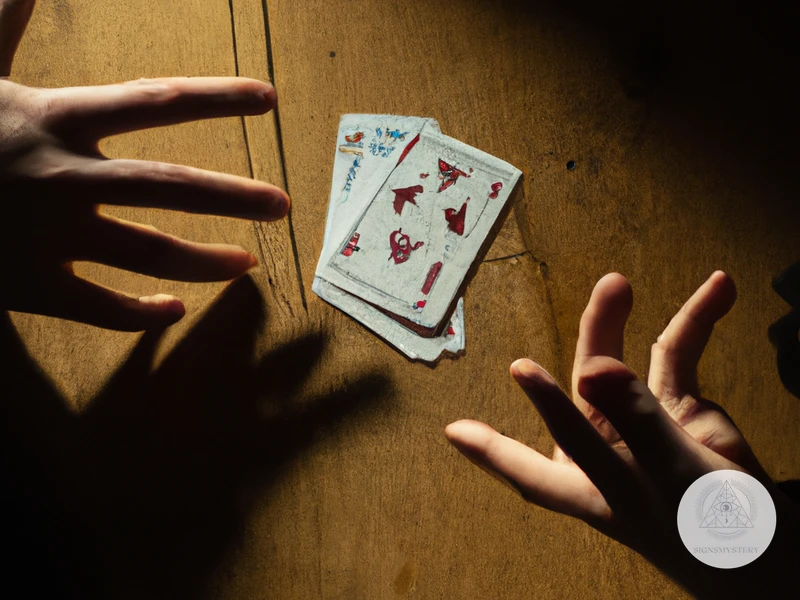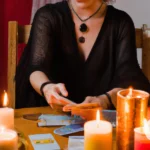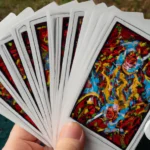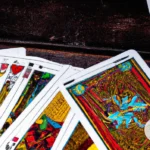Tarot readings have been used for centuries to provide insight, guidance, and clarity. However, the effectiveness of a tarot reading heavily depends on the quality of questions being asked. Asking the right questions is essential to getting the most out of a tarot reading, but it can be challenging to know what to ask. In this article, we will explore the art of asking the right questions in tarot readings, providing step-by-step guidance on how to formulate effective questions. Whether you are new to tarot readings or you have been practicing for years, this guide will help you ask purposeful questions that will enhance your understanding of yourself and the world around you.
What are Tarot Readings?
Tarot readings are a powerful tool for gaining insight into different aspects of our lives. They involve using a deck of Tarot cards to explore past, present, and future events. Tarot cards are made up of 78 cards divided into the Major Arcana and the Minor Arcana. The Major Arcana consists of 22 cards, each representing a significant life event or aspect, and the Minor Arcana contains 56 cards, divided into four suits (Wands, Cups, Swords, and Pentacles), each with its own meaning.
Tarot readings can provide answers to questions about relationships, career, personal growth, and more. They can also serve as a guide to decision-making, by helping us understand the consequences of different choices.
It’s important to note that Tarot readings should not be seen as a way to predict the future or make decisions for us. Rather, they offer guidance and insight that allows us to make informed decisions based on our current circumstances.
Here are some common types of Tarot readings:
| Celtic Cross Spread: This is one of the most popular Tarot spreads. It consists of ten cards that delve into the past, present, future, and subconscious aspects of the question asked. |
| Three-Card Spread: This simple spread involves drawing three cards that represent the past, present, and future of the question asked. |
| One-Card Spread: This spread involves drawing a single card that provides insight and guidance on the question asked. |
| Relationship Spread: As the name suggests, this spread focuses on relationships and involves drawing multiple cards to explore different aspects of the relationship. |
Tarot readings can be done by a professional Tarot reader or by oneself. Learning to read Tarot cards oneself involves understanding the meanings of each card, studying different spreads, and developing one’s intuition. It’s also important to note that each individual may have different interpretations of the cards based on their personal experiences and beliefs.
For those wishing to learn more, resources such as Developing Your Intuition: Tarot Tips, How to Read Tarot Cards Yourself, and Different Spreads to Read are available online.
Importance of Asking the Right Questions
Asking the right questions is crucial to a successful Tarot reading. It’s not merely about seeking answers to specific queries, but rather, it is about directing the tarot cards to provide insights into the querent’s deepest concerns and questions.
The way we frame our questions is essential as it sets the tone for the entire reading. Efficient questioning is one of the fundamental skills that any good Tarot reader must possess. An insightful and well-crafted question ensures that the Tarot reading will provide the necessary insights to understand the situation more profoundly.
Through precise questioning, a Tarot reader can obtain an accurate understanding of the querent’s situation and provide helpful advice. Inaccurate or ambiguous questioning, on the other hand, can generate vague answers, leaving the querent feeling unsatisfied and confused with the reading’s results.
Asking the right questions in a Tarot reading is also necessary for a deeper understanding of ourselves and our lives. Approaching the reading from a place of curiosity and openness can lead to discovering new possibilities, hidden emotions, and perspectives. Tarot is not only a divination tool; it is also a instrument for self-discovery, providing an opportunity for personal and spiritual growth.
It is essential to reflect on the purpose of the Tarot reading, spend time composing meaningful questions, and approach the reading with an open mind and heart. A Tarot reading can reveal powerful insights and offer guidance, but it all begins with asking the right questions.
Asking Effective Questions

Effective questioning is crucial to getting accurate and insightful readings from tarot cards. Here are some tips on how to ask the right questions:
When asking a question, be as specific as possible. Avoid vague or general questions that may get confusing or lead to unclear answers. Instead, focus on a particular situation or aspect of your life.
Avoid asking yes or no questions. While they may seem straightforward, they do not allow for a in-depth answer or a deeper understanding of the situation. Instead, rephrase the question so that it requires an explanation or advice.
Be mindful to avoid asking questions related to timeframes. Timing is fluid and subject to change, so asking for specific timeframes or deadlines can lead to disappointment and frustration. Instead, try to phrase your questions in a manner that addresses the present moment and its impact on the future.
Open-ended questions are best for tarot readings. They give the reader more room to interpret the card’s meaning with more context. Open-ended questions tend to start with phrases, such as “What can I do…” or “How can I improve…”
When asking about others, it’s important to respect their privacy. It’s important to ask for permission from the person first before asking about them. If you have not received their consent, it is better to avoid asking about them altogether.
Tarot readings are not a substitute for medical or legal advice. Avoid questions that relate to health and legal matters. The cards are meant to provide insight into spiritual, emotional, and personal issues, not to diagnose or provide legal advice.
When asking questions, focus on yourself and your own actions. Avoid asking questions that rely on others or outside circumstances. This way, you’ll get answers that give you insight into your situation and help you learn how to deal with it independently.
Finally, it’s important to ask empowering questions that will help you gain insight and move towards a positive future. Try reframing negative questions into ones that are positive and empowering. For instance, instead of asking, “Why am I always unlucky in love?”, rephrase the question into “How can I attract a loving and healthy relationship?”
By following these tips, you’ll be able to get the most out of your tarot readings and gain valuable insights into your life situations.
Be Specific
When asking questions in a tarot reading, being specific is essential for getting an accurate and useful answer. Vague or general questions can lead to unclear or irrelevant responses. Here are some tips for being specific when asking questions in a tarot reading:
| Instead of: | Ask: |
| “What is my future?” | “What should I focus on for my career in the next six months?” |
| “What about my love life?” | “What can I do to improve the communication in my relationship?” |
| “What is the outcome of my new business venture?” | “What steps can I take to make my new business venture successful?” |
It’s also important to avoid assumptions when asking questions in a tarot reading. For example, instead of asking “Why did my ex-boyfriend cheat on me?”, which assumes that he did cheat, you could ask “What can I do to heal from my past relationship and move on?” This question is more empowering and open-ended, allowing the tarot to provide deeper insights and guidance.
By being specific in your questions, you can gain clarity and direction in your tarot readings. This will ultimately lead to a more meaningful and insightful experience.
Avoid Yes or No Questions
Asking yes or no questions might seem like an easy way to get a straightforward answer, but in reality, it can limit the depth and complexity of the reading. Such questions may provide a superficial response, leaving the client wondering about what’s behind the answer. Instead, aim to create thought-provoking questions that inspire contemplation and self-reflection. By doing this, clients will attain a better understanding of life situations and receive meaningful insights that can lead to the desired outcomes.
For example, rather than asking, “Will I get the job I applied for?”, ask a broader question like “What can I do to improve my chances of getting the job?” or “What do I need to know to make the best decision about my career?” This allows the client to gain insight into what could help them, rather than just receiving a yes or no answer.
By avoiding yes or no questions, it will also allow the client to see how their actions and thoughts influence their situation. The essence of Tarot readings is to encourage clients to get closer to their intuition and tap into their inner wisdom, enabling them to make decisions and choices that will better serve them.
So, instead of focusing on yes or no questions, try to ask expansive questions that inspire deeper reflection and exploration. Doing so can provide a more valuable and profound experience for both the client and the reader.
Pro tip: Avoid asking negative questions and try to create questions that are phrased positively. This approach will help clients focus on the solution rather than the problem they might be encountering.
Avoid Asking for Timeframes
As humans, we are naturally curious about the future and can sometimes feel tempted to ask about specific timeframes during a tarot reading. However, it’s important to avoid asking for timeframes during a tarot reading. Tarot cards might offer insight and guidance, yet they are not meant for exact predictions. Instead of giving you a straightforward answer, tarot readings offer an interpretation of the given situation, complete with all its complexities, nuances, and potential outcomes.
When we ask for specific timeframes, we may be unconsciously trying to gain control over the situation or seeking a sense of security in an uncertain future. Yet, by focusing on specific dates or timeframes, we limit the scope of our question, which in turn may not provide us with the most valuable information available.
Another reason why we should avoid asking for timeframes is because tarot readings and the art of divination are inherently intertwined with the concept of synchronicity. Synchronicity is the belief that everything in the universe is interconnected and that significant coincidences occur without any apparent causal explanation. Putting an exact timeframe on the outcome of a situation can disrupt the natural flow of events and interfere with the synchronistic nature of the Universe.
Instead of asking for a specific timeframe, try focusing on asking open-ended questions that are centered around your desired outcome. It’s okay if you don’t receive an exact answer, as the cards may offer additional insights that may not have been apparent at first.
It is best to avoid asking for timeframes during a tarot reading. Remember that tarot readings are a tool for self-reflection, insight, and self-improvement, and not a tool for exact predictions. By focusing on open-ended questions and embracing the fluidity of the Universe, you’ll be able to tap into the true power and potential of tarot readings.
Open-ended Questions
Open-ended questions are questions that cannot be answered with a simple “yes” or “no”. These questions are designed to encourage the querent to explore their thoughts and feelings in greater depth. Open-ended questions in tarot readings can help uncover the underlying issues that are influencing the situation being discussed. By asking open-ended questions, the tarot reader can help the querent gain a deeper understanding of their situation and potential solutions.
Examples of open-ended questions in tarot readings include:
- What emotions are you experiencing in this situation?
- How do you feel about the potential outcomes of this decision?
- What factors do you need to consider before making a choice?
- What are the potential consequences of each of your options?
- What is the lesson you need to learn from this experience?
Open-ended questions require the querent to think more deeply about their situation and to explore their feelings and thoughts. This can help them gain insight into their situation and to identify potential solutions that they would not have considered otherwise.
As a tarot reader, one needs to develop skills in asking open-ended questions. This can be done by avoiding questions that can be answered with a simple “yes” or “no” and instead, asking questions that encourage the querent to explore their thoughts and emotions in greater depth.
Open-ended questions are an essential tool for tarot readers as they help to bring clarity and understanding to the reading. By asking open-ended questions, tarot readers can help the querent to gain a deeper understanding of their situation, to consider new perspectives and possibilities, and to find their way towards a more fulfilling life.
Avoid Asking about Others Without Their Consent
When it comes to asking questions during a Tarot reading, it is important to be aware of the boundaries of others. Asking about someone else’s personal life without their consent can be seen as intrusive and disrespectful. This can also compromise the Tarot reader’s ethics.
Whether it’s a friend, family member, or stranger, a Tarot reading is a personal experience. It is up to the individual to decide what they want to share and what they keep private. Asking about others without their consent can violate their privacy and create unnecessary strain in your relationship.
To avoid this issue, focus on questions that pertain to yourself. This will allow you to gain insight and clarity without crossing any ethical boundaries. If you are seeking information about someone else, try to obtain their permission before asking a Tarot reader.
To summarize, here are a few tips to help you avoid asking about others without their consent during a Tarot reading:
- Stay focused on yourself: By asking questions that pertain to yourself, you can gain insight and clarity without violating anyone’s privacy.
- Get permission: If you are seeking information about someone else, try to obtain their permission before asking a Tarot reader.
Ultimately, Tarot readings are about personal growth, self-discovery, and gaining deeper understanding. By respecting the privacy and boundaries of others, you can enhance your own experience and maintain a healthy relationship with those around you.
Avoid Asking about Health and Legal Matters
When it comes to tarot readings, it’s important to remember that they are not a substitute for professional medical or legal advice. As such, it’s best to avoid asking questions related to these sensitive matters. Not only can it be unethical for a tarot reader to provide answers to these types of questions, but it can also be harmful to the querent if the answers obtained from the cards are incorrect or misinterpreted.
One area where this can get particularly tricky is when a querent asks a health-related question. As a tarot reader, it’s important to be upfront about the limitations of what the cards can reveal. Even if a particular card seems to indicate a certain health issue, it is not the place of the tarot reader to diagnose or provide medical advice. Instead, the reader can focus on broader themes related to self-care and holistic well-being.
Legal matters are another sensitive area where it’s best to tread carefully. Questions related to ongoing court cases or pending lawsuits should be avoided, as it is not ethical or appropriate for a tarot reader to provide guidance on these matters. However, if a querent is seeking insight on a general life path or career direction, it’s possible that a tarot reading could provide helpful guidance in these areas.
To sum up, when it comes to tarot readings, it’s important to use common sense and avoid asking questions related to health and legal matters. Instead, focus on more empowering and meaningful questions that can help the querent gain insight and clarity in their lives.
Focus on Yourself
Focusing on yourself is crucial when asking questions in tarot readings. Remember that tarot readings are not meant to provide you with a solution to your problems but rather to guide you in making decisions and empowering you to take control of your life. By asking questions that focus on yourself, you are acknowledging that you have the power to make changes in your life.
It’s important to ask questions that focus on your thoughts, feelings, and actions instead of asking about external factors that you have no control over. For instance, instead of asking, “Will I get a promotion at work?”, ask questions like, “What can I do to enhance my career prospects?” or “What skills do I need to develop for career growth?”
Focusing on yourself also means being honest with yourself and accepting the answers that the tarot cards reveal. If you aren’t prepared to hear the truth, then you shouldn’t ask the question in the first place.
Remember that the tarot cards can be a powerful tool for self-discovery and introspection. By asking questions that focus on yourself, you allow the tarot to guide you towards a deeper understanding of your thoughts, feelings, and behaviors.
In a tarot reading, you may discover aspects about yourself that you weren’t aware of before. This can be a transformative experience, so be prepared to confront your own vulnerabilities and work towards making positive changes.
Finally, avoid asking questions that try to control the outcome of a situation. For instance, instead of asking, “How can I make him fall in love with me?”, ask questions like, “What actions can I take to improve my love life?”.
By focusing on yourself, you are not only taking responsibility for your life but also acknowledging that you have the power to create change. Trust the tarot cards to guide you towards the right path, but ultimately, the decision is up to you.
Ask Empowering Questions
Asking empowering questions in a tarot reading can help you focus on solutions and take control of your life. By asking questions that encourage positive action, you can gain insight into how to move forward in a more enlightened way. Here are some tips for asking empowering questions:
- Avoid victim mentality: Instead of asking “Why do bad things always happen to me?” ask “How can I change my situation for the better?”
- Focus on solutions: Instead of asking “What’s going to go wrong?” ask “What can I do to make things go right?”
- Tap into your strengths: Instead of asking “Why am I not good at this?” ask “What are my strengths in this situation and how can I use them?”
- Use positive language: Instead of asking “What mistakes will I make?” ask “What are the opportunities for growth and learning in this situation?”
Empowering questions allow you to take ownership of your life and make choices that reflect your values and goals. By framing questions in a positive, action-oriented way, you can create a mindset that is open to possibilities and growth. Combining empowering questions with the guidance of tarot can create
Subscribe to Our Newsletter
Sign up to receive the latest news and updates.
In the next section, we will discuss how to prepare for asking tarot questions by cleansing your mind and environment.
Preparing to Ask Questions
Asking the right questions during a tarot reading is important, but it’s also essential to prepare yourself properly beforehand. This can help you to get the most out of your experience and increase the chance of receiving accurate and insightful answers from the cards. Here are some tips on how to prepare to ask questions during a tarot reading.
Before asking questions during a tarot reading, it’s crucial to cleanse your mind and environment. This means taking a few moments to clear your mind of any distracting thoughts or negative emotions that may be clouding your judgment. One way to do this is through meditation or deep breathing exercises. By establishing a calm and centered state of mind, you’ll be better able to focus on your questions and receive more accurate answers.
In addition to cleansing your mind, it’s also important to ensure that your environment is free from any distractions or negative energy. Consider lighting a candle, burning some incense, or playing meditation music to help establish a peaceful atmosphere.
Another important step in preparing to ask questions during a tarot reading is to reflect on your motivations. Why are you seeking answers from the cards? What specific areas of your life are you looking to improve or gain clarity on? By taking the time to reflect on these questions, you’ll be better able to formulate specific questions that are relevant to your current situation.
In order to get the most out of your tarot reading and ask the right questions, it’s essential to connect with your intuition. This means trusting your gut instincts and listening to your inner voice. One way to do this is to practice mindfulness and pay attention to your thoughts and emotions. By tuning into your intuition, you’ll be better able to ask questions that are meaningful and relevant to your life.
Finally, it’s important to consider the context of your tarot reading when preparing to ask questions. For example, are you seeking answers about a specific situation or decision? Or are you looking for guidance on a more general level? By understanding the context of your reading, you’ll be able to ask questions that are specific and tailored to your unique needs.
Preparing to ask questions during a tarot reading involves taking the time to cleanse your mind and environment, reflect on your motivations, connect with your intuition, and consider the context of your reading. By following these steps, you’ll be better equipped to ask the right questions and receive accurate and insightful answers from the cards.
Cleanse Your Mind and Environment
Before asking questions in a tarot reading, it’s recommended to cleanse both your mind and environment to ensure clarity and focus. An uncluttered, serene space allows you to focus on the task at hand with minimal distractions. It’s helpful to have a dedicated space for your tarot practice, whether it’s a separate room or a quiet corner of your home.
When it comes to cleansing your mind, take a few deep breaths and release any negative thoughts or emotions. You can also visualize a white light surrounding you and cleansing any negativity from your being. This helps you connect to your intuition and keeps you focused on the present moment.
As for your environment, there are many ways to cleanse the space for a tarot reading. Burning sage or palo santo can clear any negative energy, or you can sprinkle salt water around the room. You can also use crystals such as clear quartz or amethyst to promote positive energy and clarity.
Ultimately, the goal is to create a peaceful and positive environment for the tarot reading. By cleansing your mind and space, you are better equipped to ask the right questions and receive accurate insights from the cards.
Reflect on Your Motivations
It’s important to take a moment to reflect on your motivations before you start asking questions during a Tarot reading. Your motivations can greatly impact the types of questions you ask and the clarity of the answers you receive.
One thing to consider is whether you’re seeking a Tarot reading for curiosity or for guidance. Curiosity may prompt you to ask questions about the future or seek entertainment. On the other hand, seeking guidance may lead you to ask questions about your personal development or how to reach your goals.
Another factor to reflect on is whether you’re asking questions to gain control over a situation or to gain insight. If you’re looking for control, you may be tempted to ask about timeframes or details. However, gaining insights may lead to broader questions about the meaning of your experiences.
It’s also important to approach your reading with an open mind. Don’t try to manipulate the cards to give you the answer you want to hear. Instead, try to be receptive to the guidance the cards provide. Remember that the interpretation of the cards can have multiple meanings and can be influenced by your personal experiences and synchronicities.
Before a reading, it can be helpful to write down your questions and reflect on the intentions behind each one. This can help you identify any underlying fears or desires that may be influencing your questions. Additionally, consider how each question fits into the overall theme of your reading, and if it will contribute to your personal growth and development.
Reflecting on your motivations can help you approach your Tarot readings with intention and openness. It can help you to ask effective questions and receive clarity and guidance from the cards. Remember to write down your questions, consider your intentions, and be receptive to the messages of the Tarot.
Connect with Your Intuition
Connecting with your intuition is a crucial aspect of tarot reading that should not be overlooked. Your intuition is your inner voice that guides you towards the right path and helps you understand the answers provided by the tarot cards. The more connected you are with your intuition, the easier it will be for you to interpret the messages in the cards.
One of the ways to connect with your intuition is by setting the right environment. Ensure you are in a quiet, peaceful space with minimal distractions. Light some candles and incense to create a calming atmosphere, and ensure you have ample time for your reading without any interruptions.
It’s also essential to have a clear mind focus. Take a few deep breaths and let go of any negative or distracting thoughts. Try to be present in the moment and connect with your inner self. Meditation exercises can help you achieve this clarity and connect with your intuition at a deeper level.
You can also connect with your intuition by holding the cards in your hand. When doing this, try and focus your energy on the card and its message. Trust your inner voice to direct you towards the right interpretation.
Remember, tarot readings are not just about understanding the individual meanings of each card; it’s about tapping into your innermost being to access the messages lurking beneath. The more connected you are with your intuition, the easier it will be for you to understand the symbolism represented by each card.
By connecting with your intuition, you can also gain a deeper understanding of the multiple meanings of tarot cards. To learn more about this topic, you can read our article on multiple meanings of tarot cards and how they impact your readings.
Consider the Context
When asking questions during a tarot reading, it’s essential to consider the context. The context of a tarot reading includes the situation or issue you want to focus on, your emotional state, the specific tarot deck you’re using, and even the time and place of the reading.
Firstly, the situation or issue you want to focus on is a critical factor in the questions you ask. For example, if you are seeking guidance on a relationship problem, the questions you ask will be vastly different from those you would ask about career or financial matters. It’s important to be clear about the situation that needs insight and frame your questions accordingly.
Secondly, your emotional state can also impact the questions you ask. If you’re feeling anxious or angry, your questions may be framed negatively, leading to answers that focus on the worst possible outcome. On the other hand, if you’re coming from a place of peace and calm, your questions may be more open-minded, leading to more positive and uplifting answers.
Thirdly, the tarot deck you’re using can also impact the questions you ask. Each tarot deck has its unique imagery, symbolism, and interpretation, which can influence the types of questions you ask. For instance, if you’re using the Rider-Waite deck, which is rich in imagery and symbolism, you may frame your questions to align with the imagery of the cards.
Finally, the time and place of the reading can also impact the types of questions you ask. For example, if you’re in a public place where many people are around, you may not feel comfortable asking personal questions, whereas, in a private setting, you may be more inclined to ask deeper and more personal questions.
When asking questions during a tarot reading, it’s important to consider the context. The context includes the specific situation or issue you want insight into, your emotional state, the tarot deck you’re using, and the time and place of the reading. By considering these factors, you can frame your questions more effectively, leading to clearer and more insightful answers from the tarot.
Conclusion
In conclusion, asking the right questions in tarot readings is crucial for receiving accurate and helpful guidance. By following the tips outlined in this article, such as being specific, asking open-ended questions, and avoiding certain topics, you can ensure that your questions are empowering and yield insightful responses.
Remember to prepare yourself before asking questions by cleansing your mind and environment, reflecting on your motivations, and connecting with your intuition. It’s also important to consider the context in which you are asking your questions, whether it be a personal reading or a reading for someone else.
Asking effective questions can lead to a deeper understanding of yourself and your path, and can help you navigate life’s challenges with more clarity and confidence. So take some time to formulate your questions carefully, and trust in the wisdom of the tarot to guide you towards your highest good.
Frequently Asked Questions
Can I ask the Tarot any question?
Yes, you can ask any question that is important to you. However, it’s important to formulate your question in a way that will allow you to get the most out of the Tarot reading.
What types of questions should I avoid when asking the Tarot?
Avoid asking questions about other people’s lives without their consent, health or legal matters, and questions that require a simple yes or no answer. Additionally, try to stay away from questions that are anxiety-provoking or too broad.
What is an open-ended question?
An open-ended question is one that cannot be answered with a simple yes or no. These types of questions encourage exploration and give you the space to elaborate on what you’re feeling. They also help the Tarot reader to delve deeper into the cards and get more detailed answers.
Why is it important to focus on myself when asking questions?
Focusing on yourself when asking questions is important because Tarot readings should be used as a tool for self-discovery and personal growth. When you ask questions that are focused on yourself, you allow yourself to explore your own thoughts and feelings in a more meaningful way.
What does it mean to “cleanse” my mind and environment?
Cleansing your mind and environment means to get rid of any negative energy that might be weighing you down. This can be done through meditation, smudging with sage, or simply taking a moment to clear your mind before a reading.
Why is it important to reflect on my motivations before a Tarot reading?
Reflecting on your motivations before a Tarot reading can help you to get more meaningful answers. By being clear about what you hope to learn from the reading, you give your subconscious mind a chance to focus on those areas, which can lead to more accurate and helpful insights.
What is intuition, and how do I connect with it?
Intuition is a feeling or sense that you have about something, even if you can’t explain why. To connect with your intuition, try quieting your mind and focusing on your breath. Pay attention to any feelings or sensations that come up, and try to interpret their meaning.
What is the best way to ask empowering questions?
The best way to ask empowering questions is to focus on the positive. Instead of asking what might go wrong, ask what you can do to make things go right. Framing your questions in a positive light can help you to feel more confident and motivated in your actions.
What should I do if I don’t understand the cards in my reading?
If you don’t understand the cards in your reading, don’t be afraid to ask your Tarot reader for clarification. They may be able to offer additional insights or guidance that you didn’t pick up on initially.
Do I need to believe in Tarot to get a reading?
No, you do not need to believe in the Tarot to get a reading. However, it’s important to approach the reading with an open mind and willingness to explore new perspectives and ideas.










